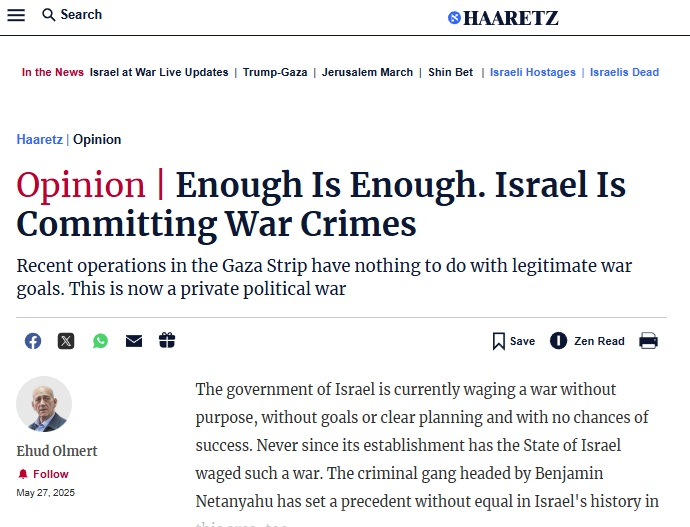Growing Global Recognition of War Crimes and Genocide in Gaza
This shift in global rhetoric underscores a dramatic change in how the international community perceives the Gaza conflict and calls into question long-standing assumptions about proportionality, civilian protection, and accountability.
A Former Israeli Prime Minister Breaks Ranks
Among the most striking developments is the recent condemnation from former Israeli Prime Minister Ehud Olmert. In a candid interview with CNN, Olmert, who led Israel from 2006 to 2009 and has long defended the country’s military actions, said he can no longer support Israel’s conduct in Gaza.“What we are doing in Gaza now is a war of devastation: indiscriminate, limitless, cruel and criminal killing of civilians,” Olmert wrote in an op-ed published in Israel’s Haaretz newspaper. He pointed specifically to the 11-week blockade of humanitarian aid and the staggering civilian death toll—over 54,000 Palestinians, including at least 28,000 women and children.
In the CNN interview, Olmert asked pointedly, “What is it if not a war crime?”
Legal Classifications: War Crimes, Crimes Against Humanity, Genocide
Legal bodies and human rights organizations are now using increasingly severe language to describe the situation. The International Criminal Court (ICC) has issued arrest warrants for Israeli Prime Minister Benjamin Netanyahu and former Defense Minister Yoav Gallant. The charges include war crimes and crimes against humanity, such as using starvation as a method of warfare and the intentional targeting of civilians.
Meanwhile, Amnesty International has concluded that Israel’s actions in Gaza meet the legal definition of genocide. In a December 2024 report, the organization cited Israel’s systematic destruction of civilian infrastructure, the blockade of essential humanitarian aid, and the forced displacement of hundreds of thousands as evidence of intent to destroy the Palestinian population “in whole or in part.”
Human Rights Watch similarly highlighted the widespread forced displacement of Palestinians from northern to southern Gaza under bombardment, describing the humanitarian conditions as “hopeless, starving, and besieged.”
Political and Cultural Condemnation
Condemnation is no longer confined to legal experts. Across the globe, political leaders, cultural figures, and civic organizations are denouncing the scale and intensity of Israel’s actions.
A letter signed by 380 writers and artists—including literary figures Zadie Smith and Ian McEwan—described Israel’s offensive as a “genocide,” demanding an immediate ceasefire and the opening of humanitarian corridors. Italy’s Foreign Minister, Antonio Tajani, has also urged Israel to halt its offensive and resume the flow of aid, citing violations of international humanitarian law.
“We cannot remain silent in the face of such widespread suffering,” Tajani said during a press briefing in Rome on Tuesday. “Bombing must stop. Humanitarian law must be respected.”
Meanwhile, far-right rhetoric in Israel and abroad has added fuel to concerns. Multiple officials and commentators—including Israeli Heritage Minister Amichai Eliyahu—have suggested using nuclear weapons on Gaza, comments that were widely condemned but not universally disavowed. Similar statements have emerged from U.S. political figures, amplifying fears of normalization of genocidal language.
A Turning Point for International Accountability?
For decades, criticism of Israel’s military tactics in the occupied Palestinian territories has been met with hesitation or dismissal by many Western governments. But the scale of devastation in Gaza appears to have catalyzed a reckoning. The mounting civilian death toll, deliberate targeting of infrastructure, and documented obstruction of aid delivery have shifted the discourse from political dispute to one of legal and moral urgency.
As former Prime Minister Olmert's reversal suggests, even those once closely aligned with Israeli military policy now struggle to justify what is unfolding. The increasing use of legal terms like “genocide” and “war crimes” reflects not just emotional outrage but a growing alignment with international law. The implications are profound. Beyond diplomatic fallout, these charges could result in travel restrictions for Israeli leaders, international sanctions, and formal proceedings in the ICC. Whether the international community will enforce accountability remains to be seen. But the growing consensus is clear: what is happening in Gaza is not simply the collateral damage of war—it is a humanitarian catastrophe demanding urgent, coordinated, and courageous global response.
Sources:


























